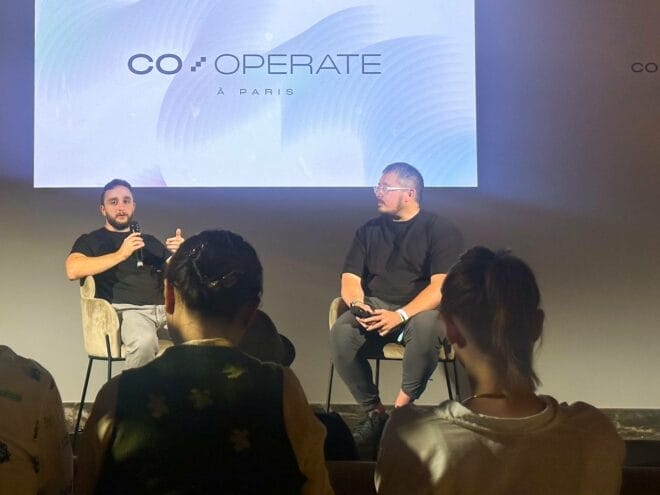The Chainlink SCALE program is designed to accelerate the growth of layer-1 and layer-2 ecosystems through Chainlink’s oracle services. Networks participating in SCALE cover certain operating costs of Chainlink oracle nodes for a period of time, giving developers access to essential Chainlink web3 services in order to accelerate the network’s ecosystem growth.
EVM-compatible blockchain ecosystem Celo recently joined SCALE in order to support its mobile-first, regenerative finance (ReFi)-focused ecosystem’s long-term sustainability. Celo’s carbon-negative, permissionless layer-1 protocol is accessible to anyone with a mobile phone and supports an ecosystem of more than 1,000 innovative web3 applications.
At last month’s CoOperate event in Paris, Celo Foundation’s Global Head of Developer Relations, Eric Nakagawa, sat down with Chainlink Labs’ Chief Business Officer, Johann Eid, for a fireside chat about the benefits SCALE offers developers on Celo and throughout web3.
“Our core mission at Chainlink since the very beginning has been: how can we provide the tools that developers don’t have today on-chain, so that they can actually build stuff that matters, build stuff that can change the world and have an impact?” said Eid.
As the web3 industry’s leading decentralized oracle network, Chainlink has already enabled over $8 trillion in transaction value throughout the DeFi economy. Because the Chainlink Network comprises dozens of independent node operators, Eid said it’s essential to maintain an incentive system that ensures validators continuously publish high-quality data on-chain.
“SCALE is a program that allows us to work with chains like Celo in order to create a data-rich environment in an extremely secure manner,” he explained.
The goal of subsidizing operational costs of critical Chainlink services on Celo is to facilitate a sustainable economic model where Celo’s ecosystem generates sufficient revenue to fully cover the backend costs of oracle services. As more blockchain networks securely scale through Chainlink oracles, the cryptoeconomic security of the Chainlink Network and the entire web3 ecosystem follows suit.
“That’s really the goal of powering and bootstrapping DeFi ecosystems through this program,” Eid said.
Access to key Chainlink services on Celo enables developers to build increasingly sophisticated dApps that close the gap between DeFi and traditional finance. Eid said he’s particularly excited to see the DeFi derivatives market take shape.
“If you look at the TradFi world we have today, most of the value is actually in derivative contracts,” he explained.
The advent of high-speed chains like Celo coupled with the ability to reduce gas costs expands possibilities for derivatives in DeFi.
“I think derivatives will follow the TradFi example,” Eid said. “They will be the place where a lot of the value in our crypto ecosystem actually sits, so that’s something I’m extremely excited about.”
Watch the full fireside chat.


